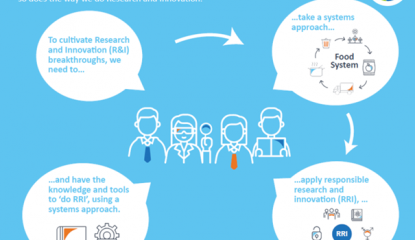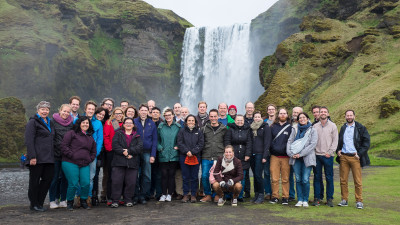FIT4FOOD2030 - Fostering Integration and Transformation for FOOD 2030

Europe faces significant challenges to ensure the availability and consumption of healthy, affordable, and sustainably produced food. Promising initiatives often fail to become embedded in the wider context, and to reach food-deprived and vulnerable groups. We urgently need to develop actionable research and innovation (R&I) to support such initiatives and contribute to food system transformation. The main goal of FIT4FOOD2030 (2017-2020) was to deploy the European Commission’s Food 2030 policy framework for R&I, by bringing together a wide variety of stakeholders at the level of cities, regions and countries across Europe.
Impact
The FIT4FOOD2030 project established 25 Labs across Europe. Through these Labs, FIT4FOOD2030 has catalysed competence development, raised awareness and aligned R&I policies through systems thinking and multi-stakeholder engagement. The experiences from the Labs have shown how multi-stakeholder partnerships can catalyse change, but only if they apply flexibility, and structured methodology, as well as builds trust. Based on the experiences from the multi-stakeholder Labs, FIT4FOOD2030 has developed a Knowledge Hub with hands-on resources to facilitate food systems transformation by network building, visioning, system understanding and co-creating actions within the transformative networks of stakeholders and audiences. The project also established the Sustainable Food Systems Network (SFSN), which helps people connect, share knowledge, and inspire each other. Everyone can join this growing network.
Prof. dr. Jacqueline Broerse (VU Amsterdam): “The important work in FIT4FOOD on bridging the gap between science, policy and practice is now continued in FoodCLIC through a reflexive process of co-designing and co-implementing real-life interventions in food distribution and markets, urban agriculture and food procurement that deliver co-benefits, and result in integrated food policies.“
The lessons from FIT4FOOD2030 have inspired the FoodCLIC project (2022-2027), which is implementing the developed Lab methodology. FoodCLIC, also coordinated by Jacqueline Broerse, aims to create urban food environments that make healthy and sustainably-produced food, affordable and attractive to all citizens. To this end, FoodCLIC is strengthening Food Policy Networks in eight city-regions across Europe and eight broadening city-regions in Europe and Africa. Other EU food projects VU’s Athena Institute is and has been involved in are: CLEVERFOOD, VISION4FOOD, FOSTER, TRUSTyFOOD, DOMINO, VISION4FOOD, FoSSNet and FUSILLI.
More info: www.fit4food2030.eu, www.foodclic.eu
Horizon 2020 - Societal Challenges: Food security, sustainable agriculture and forestry, marine, maritime and inland water research, and the bioeconomy
Horizon Europe – Global Challenges: Food, Bioeconomy, Natural Resources, Agriculture and Environment
Meer verhalen van Vrije Universiteit Amsterdam
-

-
LINKS: Strengthening links between technologies and society for European disaster resilience
Vrije Universiteit Amsterdam
